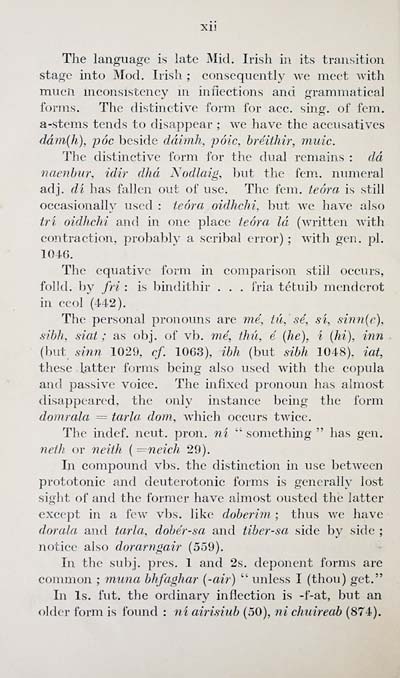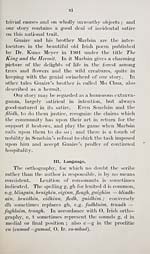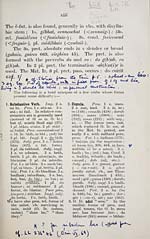Download files
Complete book:
Individual page:
Thumbnail gallery: Grid view | List view

The language is late Mid. Irish in its transition
stage into Mod. Irish ; consequently we meet with
mucn inconsistency m inflections and grammatical
forms. The distinctive form for ace. sing, of fem.
a-stems tends to disappear ; we have the accusatives
dám(h), póc beside dáimh, póic, bréithir, muic.
Tlie distinctive form for the dual remains : da
naenbiir, idir dhá Nodlaig, but the fem.. numeral
adj. di has fallen out of use. The fem. teóra is still
occasionally used : teóra oidhchi, but we have also
tri oidhchi and in one place teóra lá (written with
contraction, probably a scribal error) ; with gen. pi.
1046.
The equative form in comparison still occurs,
folld. by fri : is bindithir . . . fria tétuib mendcrot
in ceol (442).
The personal pronouns are me, tú, sé, si, sinn{c),
sihh, siat ; as obj. of vb. me, thii, é {he), í (hi), inn
(but sinn 1029, cf. 1063), ibh (but sibh 1048), iat,
these Latter forms being also used with the copula
and passive voice. The infixed pronoun has almost
disappeared, the only instance being the form
domrala = tarla dom, which occurs twice.
The indef. neut. pron. ni " something " has gen.
neih or neith ( =neich 29).
In compound vbs. the distinction in iise between
prototonic and deuterotonic forms is generally lost
sight of and the former have almost ousted the latter
except in a few vbs. like doherim ; thus we have
dorala and tarla, dohér-sa and tiber-sa side by side ;
notice also dorarngair (559).
In the subj. pres. 1 and 2s. deponent forms are
common ; muna bhfaghar {-air) " unless I (thou) get."
In Is. fut. the ordinary inflection is -f-at, but an
older form is found : ni airisiub (50), ni chnireab (874).
stage into Mod. Irish ; consequently we meet with
mucn inconsistency m inflections and grammatical
forms. The distinctive form for ace. sing, of fem.
a-stems tends to disappear ; we have the accusatives
dám(h), póc beside dáimh, póic, bréithir, muic.
Tlie distinctive form for the dual remains : da
naenbiir, idir dhá Nodlaig, but the fem.. numeral
adj. di has fallen out of use. The fem. teóra is still
occasionally used : teóra oidhchi, but we have also
tri oidhchi and in one place teóra lá (written with
contraction, probably a scribal error) ; with gen. pi.
1046.
The equative form in comparison still occurs,
folld. by fri : is bindithir . . . fria tétuib mendcrot
in ceol (442).
The personal pronouns are me, tú, sé, si, sinn{c),
sihh, siat ; as obj. of vb. me, thii, é {he), í (hi), inn
(but sinn 1029, cf. 1063), ibh (but sibh 1048), iat,
these Latter forms being also used with the copula
and passive voice. The infixed pronoun has almost
disappeared, the only instance being the form
domrala = tarla dom, which occurs twice.
The indef. neut. pron. ni " something " has gen.
neih or neith ( =neich 29).
In compound vbs. the distinction in iise between
prototonic and deuterotonic forms is generally lost
sight of and the former have almost ousted the latter
except in a few vbs. like doherim ; thus we have
dorala and tarla, dohér-sa and tiber-sa side by side ;
notice also dorarngair (559).
In the subj. pres. 1 and 2s. deponent forms are
common ; muna bhfaghar {-air) " unless I (thou) get."
In Is. fut. the ordinary inflection is -f-at, but an
older form is found : ni airisiub (50), ni chnireab (874).
Set display mode to: Large image | Transcription
Images and transcriptions on this page, including medium image downloads, may be used under the Creative Commons Attribution 4.0 International Licence unless otherwise stated. ![]()
| Early Gaelic Book Collections > Matheson Collection > Tromdámh Guaire > (16) |
|---|
| Permanent URL | https://digital.nls.uk/82339176 |
|---|
| Description | Items from a collection of 170 volumes relating to Gaelic matters. Mainly philological works in the Celtic and some non-Celtic languages. Some books extensively annotated by Angus Matheson, the first Professor of Celtic at Glasgow University. |
|---|
| Description | Selected items from five 'Special and Named Printed Collections'. Includes books in Gaelic and other Celtic languages, works about the Gaels, their languages, literature, culture and history. |
|---|

